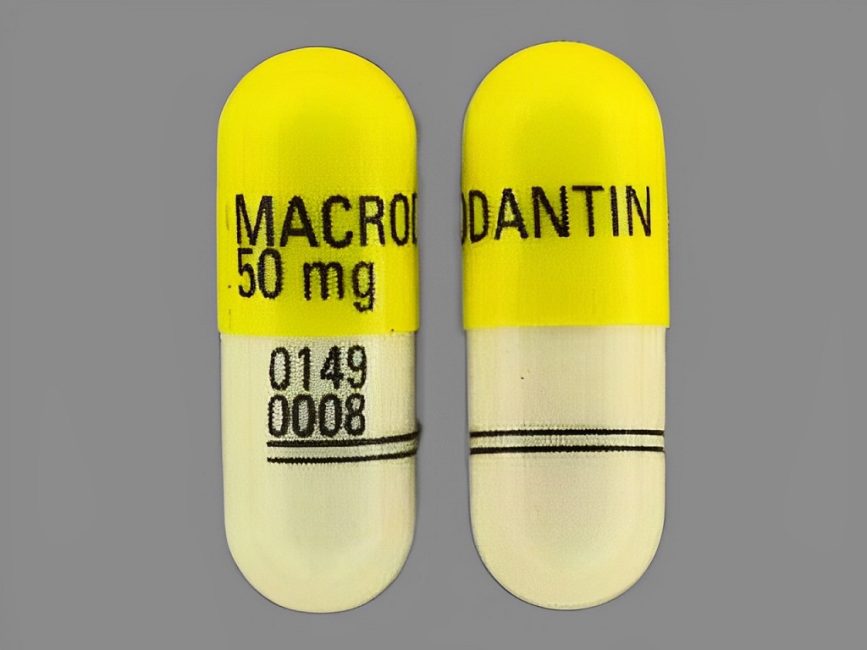How Long Does Macrobid Stay In Your System?

Macrobid. It’s a commonly prescribed antibiotic known for its effectiveness in treating UTIs caused by certain bacteria.
So, how long does Macrobid stay in your system after you take it?
Macrobid takes 24-48 hours to fully clear from the body. It has a half-life of about 12 hours, meaning half the medication is eliminated in that time. The two forms of nitrofurantoin in Macrobid work together for steady effects. Kidney function, age, dosage, and treatment duration affect its elimination. Consult your doctor for guidance and use antibiotics responsibly.
In this article, we will explore the factors that influence the elimination of Macrobid and provide you with valuable insights to help you make informed decisions about your health.
What is Macrobid?

Macrobid is a medication available as both a brand-name and generic medicine called nitrofurantoin. It is an antibiotic used mainly in adults to treat specific bacterial infections like bladder infections also known as acute cystitis.
Macrobid belong to a class of medicine called nitrofurans.
How Does Macrobid Work?
Macrobid work by stopping the growth of bacteria in our bodies. When an individual experiences a urinary tract infection (UTI), the bacteria responsible for this condition multiply, leading to discomfort.
Macrobid targets these bacterial cells and prevents them from forming properly, ultimately inhibiting their growth and reducing the infection’s severity.
Read More: Doxycycline Ruined My Life
How Long Does Macrobid Stay in Your System?
It generally takes 24 to 48 hours for Macrobid to be entirely eliminated from your body, and the half-life is 12 hours.
Nevertheless, the exact duration can vary depending on renal function, dosage, treatment duration, and age.
Macrobid is composed of two nitrofurantoin:
- Macrocrystals (25%)
- Monohydrates (75%)
These components have distinct properties that affect the medicine’s duration of action.
- Nitrofurantoin Monohydrate: This form rapidly breaks down in the digestive tract, leading to quick absorption and a fast onset of action. It promptly enters the bloodstream, providing a rapid response against bacterial infections.
- Nitrofurantoin Macrocrystals: In contrast, these macrocrystals release nitrofurantoin slowly, resulting in delayed medication absorption. This controlled release helps maintain adequate levels of nitrofurantoin in the body for extended periods.
Combining these two forms allows Macrobid to sustain a steady concentration in the body over time, despite nitrofurantoin’s relatively short individual half-life.
Once ingested, Macrobid undergoes processes in the body. It is broken down into smaller molecules in the digestive tract to enhance its absorption. Once it enters the bloodstream, it circulates throughout the entire body, including the liver.
Metabolism: The liver plays a crucial role in metabolizing Macrobid’s components. It breaks down and modifies chemical substances, including nitrofurantoin. The metabolism of Macrobid occurs relatively quickly.
Elimination: After metabolism, the medication is further processed by the kidneys and eventually eliminated from the body through urine. The elimination half-life of Macrobid is relatively short, meaning approximately half of the medication is cleared from the body within a relatively brief period.
However, due to the combination of its two forms, Macrobid can effectively remain in the body longer.
Factors Affecting Macrobid Elimination
- Renal Function: Macrobid is primarily eliminated by the kidneys. Impaired renal function can prolong the drug’s elimination half-life, leading to higher substance levels in the system. Patients with kidney issues might require lower doses and closer monitoring to avoid toxicity.
- Urinary Flow Rate: The rate at which urine flows through the urinary system affects Macrobid elimination. Increased urinary flow, achieved by drinking plenty of fluids, can accelerate the medicine’s removal from the body.
- Dosage And Treatment Duration: The duration of Macrobid treatment and the prescribed dosage can influence how long the medicine stays in the system. Higher doses and longer treatment periods can lead to a lengthier elimination time and potentially increase the risk of toxicity.
- Age: Older adults might experience slower Macrobid elimination due to age-related changes in renal function. Adjustments in dosage and closer monitoring may be necessary for this population to prevent adverse effects.
Although eliminated from the body relatively quickly, it’s important to note that Macrobid can still impact the gut microbiome and increase the risk of developing bacteria resistant to antibiotics even after elimination.
Consulting your healthcare provider for personalized guidance is essential if you have any concerns about the duration of Macrobid in your system or its impact on your body. Always follow your doctor’s instructions regarding using Macrobid to ensure safe and effective treatment.
Also Read: Can I Eat Bananas with Ciprofloxacin?
Side Effects
Macrobid (Nitrofurantoin) Common Side Effects:
- Nausea – Reported by approximately 8% of users.
- Headache – Experienced by around 6% of users.
- Gas – Occurs in about 2% of users.
Macrobid (Nitrofurantoin) Serious Side Effects:
If any of the following side effects occur, it is crucial to promptly reach out to your healthcare professional for immediate assistance:
- Severe Allergic Reaction – symptoms such as hives, rash, muscle aches, chills, fever, swelling of the lips or tongue, and difficulty breathing.
- Severe Diarrhea – Persistent or severe diarrhea should be addressed promptly.
- Trouble Breathing – If you experience trouble breathing or develop a new or worsening cough, it is crucial to seek immediate medical attention.
- Liver Problems – Look for symptoms like stomach bloating, severe stomach pain with vomiting, yellowing of the skin or eyes, and dark-colored urine.
Other Possible Side Effects of Macrobid:
While less common, the following side effects have been reported:
- Diarrhea
- Vomiting
- Upset Stomach
- Stomach Pain
- Dizziness
- Drowsiness
- Itchiness
- Fever
- Chills
- “Pins and Needles” feeling in the arms and legs
Not everyone will have these side effects, and some may have none. If you’re worried or notice strange symptoms while using Macrobid, ask your doctor for the right advice and evaluation. Your healthcare provider is there to help you.
How To Use Macrobid?
Here’s a guide on how to use Macrobid:
- Take with food: Take Macrobid by mouth with food as instructed by your doctor. Usually, you’ll need to take it twice a day, approximately every 12 hours. Swallow the medication whole for the best results.
- Avoid certain antacids: While taking Macrobid, avoid using antacids that contain magnesium trisilicate. These antacids can interact with Macrobid and prevent your body from fully absorbing it.
- Take at the same times: Take Macrobid at evenly spaced intervals for the best effect. It is better to take it at the same time every day to help you remember.
- Complete the full course: Continue taking Macrobid until you finish the entire amount prescribed by your doctor, even if your symptoms improve after a few days. Finishing the entire course is essential to eliminate all the bacteria causing the infection. Stopping the medication too early might allow the bacteria to survive and lead to a return of the infection.
- Don’t use it for viral infections: Using Macrobid for viral infections like the common cold or flu does not have any effect. So, it’s essential to avoid taking this medicine unnecessarily, as it can contribute to antibiotic resistance and reduce the effectiveness of Macrobid in the future.
- Be cautious with infants: Macrobid should not be used in infants who are younger than 1-month-old. It is also not suitable for treating infections outside the bladder, such as kidney infections like pyelonephritis or perinephric abscesses.
- Monitor your condition: Keep an eye on how you feel during treatment. If your condition lasts or gets worse, inform your doctor.
- Stay Hydrated: Drink plenty of water while taking Macrobid, especially if you are being treated for a urinary tract infection (UTI). Staying hydrated can help to flush out bacteria from your urinary system.
Remember, taking antibiotics responsibly ensures their effectiveness and prevents potential complications.
Read More: Square Butt
Dosage
The dosing of Macrobid can vary depending on whether it is for adults or children and for treating an active infection or preventing future infections.
For Adults with Cystitis:
- Regular Release: Take 50 to 100 mg of Macrobid by mouth four times a day for one week or at least 3 days after the urine is free from infection.
- Dual Release: Take 100 mg of Macrobid orally twice a day for 7 days.
For Adults with Cystitis Prophylaxis (Prevention):
- Regular Release: Take 50 to 100 mg of Macrobid by mouth once a day at bedtime to prevent future urinary tract infections.
For Children with Cystitis:
- Regular Release: For children aged 1 month or older, take 5 to 7 mg of Macrobid per kilogram of body weight per day (up to 400 mg total) by mouth, divided into four doses throughout the day.
- Dual Release: For children aged 12 years or older, take 100 mg of Macrobid by mouth twice a day for 7 days.
For Children with Cystitis Prophylaxis (Prevention):
- Regular Release: For children aged 1 month or older, take 1 to 2 mg of Macrobid per kilogram of body weight per day (up to 100 mg total) by mouth, divided into one or two doses, to prevent future urinary tract infections.
Overdose
If someone takes too much of this medication and has severe symptoms, call 911. Otherwise, contact a poison control center. US residents can call 1-800-222-1222. Canadian residents should call their provincial poison control center.
Missed Dose
If you miss a dose, take it when you remember. If it’s almost time for the next dose, skip the missed one. Don’t take a double dose.
Storage
Store at room temperature, away from light and moisture. Keep away from children and pets. Properly dispose of expired or unneeded medication.
Don’t share this medication with others. Only use it for your current condition unless your doctor says otherwise.
Precautions
- Allergies: Inform your doctor if you are allergic to Macrobid or other substances.
- Medical History: Let your doctor know about your medical history, especially if you have kidney, liver, or lung disease, G-6-PD deficiency, numbness/tingling in arms or legs, vitamin B deficiency, blood disorders, diabetes, ongoing weakness due to long-term illness, or particular eye disorders.
- Older Adults: Older adults may be more susceptible to side effects, especially nerve, liver, or lung issues, while using Macrobid.
- Vaccines: Macrobid may interfere with live bacterial vaccines like typhoid. Inform your healthcare professional before getting any immunizations/vaccinations.
- Pregnancy: Use Macrobid during pregnancy only when necessary. Avoid using it close to the end of pregnancy or during labor, as it may cause a blood disorder in the baby.
- Breastfeeding: Macrobid can pass into breast milk and affect nursing infants younger than 1 month or those with G-6-PD deficiency. Consult your doctor before breastfeeding.
Frequently Asked Questions (FAQs)
Does Macrobid Keep Working After You Stop Taking It?
After you stop taking Macrobid, it won’t continue to work. After you stop taking Macrobid, it won’t continue to work. If you quit taking Macrobid early by not following your doctor’s prescription, the infection-causing bacteria could become resistant to the antibiotic. This will make this medicine less effective in the future. So, finish the full course of treatment properly.
What Kind of Bacteria Does Macrobid Treat?
Macrobid is an antibacterial that treats urinary tract and bladder infections caused by Escherichia coli or Staphyloccocus saprophyticus bacteria, as long as these bacteria are sensitive to the medication.
Will Macrobid Cure A Kidney Infection?
Macrobid should not be used to treat kidney or deep tissue infections like perinephric abscesses. It is not effective for these types of infections. If you suspect a kidney infection, seeking medical attention for appropriate evaluation and treatment is crucial.
Read More: How Rapid is Weight Loss with Farxiga?
Conclusion
Macrobid is an antibiotic medication used to treat urinary tract infections. It works by stopping bacteria from growing in the body. Macrobid typically stays in your system for 24 to 48 hours, but individual factors can influence this.
Following your doctor’s instructions is crucial, especially if you have kidney issues or are older. Remember, using antibiotics responsibly is vital for effective treatment.





